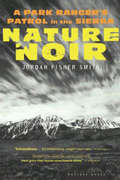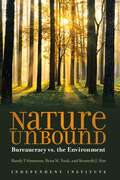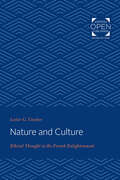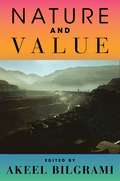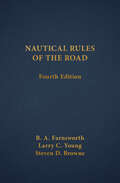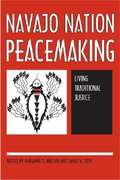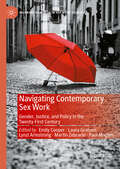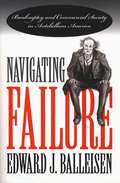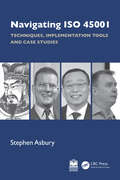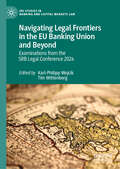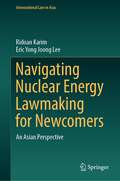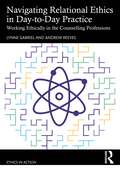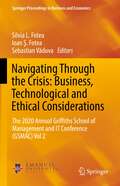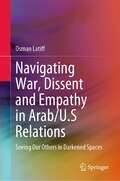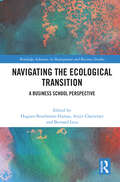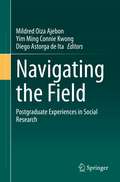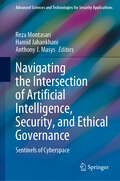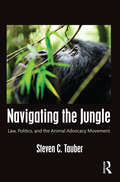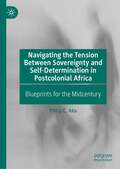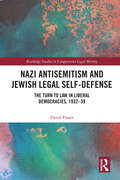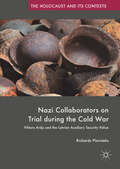- Table View
- List View
Nature Noir: A Park Ranger's Patrol in the Sierra
by Jordan Fisher Smith&“A nature book unlike any other…peppered with gritty, anti-romantic, all-too-real tales of cops &’n&’ bad guys in the great outdoors.&”—The San Diego Union-Tribune Jordan Fisher Smith&’s startling account of fourteen years as a park ranger thoroughly dispels our idealized visions of life in the great outdoors. Instead of scout troops and placid birdwatchers, Smith's beat—a stretch of land that has been officially condemned to be flooded—brings him into contact with drug users tweaked out to the point of violence, obsessed miners, and other dangerous creatures. In unflinchingly honest prose, he both portrays the breathtaking natural world around him and reveals the unexpectedly dark underbelly of patrolling and protecting public lands. &“Gloriously unlike anything I&’ve ever read before…gives entree into a strange, dark, and mesmerizing outdoor world that's absolutely unforgettable.&”—The Boston Globe &“By turns funny, poignant and surprising…an intimate memoir of the career of a state-park ranger. Not just any ranger, but one with a wicked pen, patrolling a doomed landscape.&”—Seattle Times/Post-Intelligencer &“Compelling…refreshingly unsentimental.&”—Barry Lopez, author of Arctic Dreams &“Smith offers a fresh perspective on our threatened environment…Nature Noir reflects the spirit of an era as did Desert Solitaire.&”—Charlotte Observer
Nature Unbound: Bureaucracy vs. the Environment
by Ryan M. Yonk Randy T Simmons Kenneth J. SimWhat if what we think we know about ecology and environmental policy is just wrong? What if environmental laws often make things worse? What if the very idea of nature has been hijacked by politics? What if wilderness is something we create in our minds, as opposed to being an actual description of nature?In 1934, former U.S. Forest Service offcial Aldo Leopold, a godfather to the modern environmental movement, wrote that &“restrictive laws&” had &“largely failed&” in their mission to conserve America&’s forests, rivers, and other natural resources. Less than forty years later, however, as various events pushed environmental concerns into the public spotlight, lawmakers from both parties championed legislation far more sweeping and restrictive than any Leopold had witnessed. How well did these &“restrictive laws&” work to right environmental wrongs? Why did so many miss the mark? And how should we go about improving our policies? In Nature Unbound, authors Randy Simmons, Ryan M. Yonk, and Kenneth J. Sim offer a devastating critique of federal environmental policy by scrutinizing it through the lenses of biological ecology and political ecology. This powerful framework, they show, reveals that environmental policy has been guided since the late 1960s by demonstrably false assumptions responsible for a host of ineffective or wasteful, command-and-control policies—on air pollution, water pollution, endangered species, wilderness, renewable energy, and more. The mistakes have also empowered political entrepreneurship in ways that have encroached on property rights, burdened the general public, and degraded the civic landscape. More than a critique of false assumptions and flawed policies, Nature Unbound offers bold principles to help us rethink environmental objectives, align incentives with goals, and af?rm the notion that human beings are an integral part of the natural order and merit no less consideration than Earth&’s other treasures. Ultimately, nothing less can succeed in our efforts to restore natural resources and revitalize our social and political ecosystem.
Nature and Culture: Ethical Thought in the French Enlightenment
by Lester G. CrockerOriginally published in 1963. Perhaps the most generative ethical question of eighteenth-century France was how to live a virtuous and happy life at the same time. During the Age of Enlightenment, Christianity fell out of vogue as the dominant and authoritative moral code. In place of Christianity's emphasis on sin and redemption in light of a supposed afterlife, present happiness became recognized as an appropriate end goal among French Enlightenment thinkers. French intellectuals struggled to find equilibrium between nature (a person's individual goals and needs) and culture (the political, economic, and social organization of humans for a collective good). Enlightenment discourse generated a unique cultural moment in which thinkers addressed the problems of humans' moral coexistence through the dichotomy of nature and culture. Lester Crocker addresses these questions in an overview of ethical thought in eighteenth-century France.
Nature and Value
by Jonathan Schell Jedediah Purdy Nikolas Kompridis David Bromwich Carol Rovane Joanna Picciotto Robert Pollin Sanjay Reddy Jan Zalasiewicz Bina Gogineni Anthony Laden Kyle Nichols James Hamilton TullyToday, as we confront an unprecedented environmental crisis of our own making, it is more urgent than ever to consider the notion of nature and our place within it. This book brings together essays that individually and as a whole present a detailed and rigorous multidisciplinary exploration of the concept of nature and its wider ethical and political implications.A distinguished list of scholars take up a broad range of questions regarding the relations between the human subject and its natural environment: when and how the concept of nature gave way to the concept of natural resources; the genealogy of the concept of nature through political economy, theology, and modern science; the idea of the Anthropocene; the prospects for green growth; and the deep alienation of human beings in the modern period from both nature and each other. By engaging with a wide range of scholarship, they ultimately converge on a common outlook that is both capacious and original. The essays together present a revaluation of the natural world that seeks to reshape political and ethical ideals and practice with a view to addressing some of the fundamental concerns of our time.Nature and Value features widely known scholars in a broad swath of disciplines, ranging from philosophy, politics, and political economy to geology, law, literature, and psychology. They include Jonathan Schell, David Bromwich, James Tully, Jedediah Purdy, Robert Pollin, Jan Zalasiewicz, Carol Rovane, Sanjay Reddy, Joanna Picciotto, Anthony Laden, Nikolas Kompridis, Bina Gogineni, Kyle Nichols, and the editor, Akeel Bilgrami.
Nature's Trust
by Mary Christina WoodEnvironmental law has failed in its most basic purpose. Even as ecosystems collapse across the globe and climate crisis intensifies, environmental agencies worldwide use their authority to permit the very harm that statutes were passed to prevent. This book exposes the dysfunction of environmental law and offers a transformative approach based on the public trust doctrine. An ancient and enduring principle, the public trust doctrine empowers citizens to protect their inalienable property rights to crucial resources. It holds government to a fiduciary obligation to protect such natural assets as generational inheritance for all citizens. Although the public trust has long offered a theoretical ideal for environmental law, until now it has lacked the precision necessary for citizens, government employees, legislators, educators, and judges to apply it to a broad realm of issues. This book shows how a trust principle can apply from the local to global level to protect the planet.
Nautical Rules of the Road
by Larry C. Young B. A. Farnsworth Steven D. BrowneTo celebrate the 25th anniversary of the first edition of Nautical Rules of the Road, Cornell Maritime Press has released a 4th Edition. This updated book has an easy-to-follow layout that aligns the International Rules with the corresponding Inland Rules. In addition to being highly descriptive, Nautical Rules of the Road, 4th Edition by Steven D. Browne, with early authors Larry C. Young and B. A. Farnsworth, gives the current rules as of publication and explicit comments to help readers thoroughly understand each rule. Some of the items detailed are proper lookout information to prevent collisions, positioning of light shapes, signals for fishing vessels fishing in close proximity, technical details of sound signal appliances, and violations of Inland Navigation Rules and Regulations, including penalties for negligent operations. To aid in Coast Guard examinations, the final chapter gives multiple choice, practice questions to test the reader&’s knowledge on the information found within the entire book. In addition, there is a descriptive study outline. Professional and recreational boaters alike need the new Nautical Rules on their vessels before leaving port. Don&’t toss your lines without it.
Navajo Nation Peacemaking: Living Traditional Justice
by Marianne O. Nielsen James W. ZionNavajo peacemaking is one of the most renowned restorative justice programs in the world. Neither mediation nor alternative dispute resolution, it has been called a horizontal system of justice because all participants are treated as equals with the purpose of preserving ongoing relationships and restoring harmony among involved parties. In peacemaking there is no coercion, and there are no sides. No one is labeled the offender or the victim, the plaintiff or the defendant. This is a book about peacemaking as it exists in the Navajo Nation today, describing its origins, history, context, and contributions with an eye toward sharing knowledge between Navajo and European-based criminal justice systems. It provides practitioners with information about important aspects of peacemakingÑsuch as structure, procedures, and outcomesÑthat will be useful for them as they work with the Navajo courts and the peacemakers. It also offers outsiders the first one-volume overview of this traditional form of justice. The collection comprises insights of individuals who have served within the Navajo Judicial Branch, voices that authoritatively reflect peacemaking from an insiders point of view. It also features an article by Justice Sandra Day OConnor and includes contributions from other scholars who, with the cooperation of the Navajo Nation, have worked to bring a comparative perspective to peacemaking research. In addition, some chapters describe the personal journey through which peacemaking takes the parties in a dispute, demonstrating that its purpose is not to fulfill some abstract notion of Justice but to restore harmony so that the participants are returned to good relations. Navajo Nation Peacemaking seeks to promote both peacemaking and Navajo common law development. By establishing the foundations of the Navajo way of natural justice and offering a vision for its future, it shows that there are many lessons offered by Navajo peacemaking for those who want to approach old problems in sensible new ways.
Navigating Contemporary Sex Work: Gender, Justice, and Policy in the Twenty-First Century (Palgrave Advances in Sex Work Studies)
by Paul Maginn Martin Zebracki Lynzi Armstrong Emily Cooper Laura GrahamThis book draws together interdisciplinary perspectives to examine the legal, moral, and socio-spatial regulation of sex work in the contemporary context. With a thematic focus on the gendered landscape of sex work, formal and informal methods of socio-spatial control, and (in)access to justice, this book explores the role of space in the regulation of sex work in diverse contexts, from the local to the global. The chapters collectively bring together complex, inter-related issues that impact the lives of sex workers throughout the world, providing evidence of the impacts of regulation on sex workers and subsequent barriers to accessing justice and rights. This collection centres the regulated lives of sex workers, using an intersectional lens that highlights the gendered and racialised impacts of stigma. Incorporating knowledge derived from both academic research and lived experience, this book provides a unique contribution that will be of interest to academics and policy-makers globally.
Navigating Failure
by Edward J. BalleisenThe "self-made" man is a familiar figure in nineteenth-century American history. But the relentless expansion of market relations that facilitated such stories of commercial success also ensured that individual bankruptcy would become a prominent feature in the nation's economic landscape. In this ambitious foray into the shifting character of American capitalism, Edward Balleisen explores the economic roots and social meanings of bankruptcy, assessing the impact of widespread insolvency on the evolution of American law, business culture, and commercial society.Balleisen makes innovative use of the rich and previously overlooked court records generated by the 1841 Federal Bankruptcy Act, building his arguments on the commercial biographies of hundreds of failed business owners. He crafts a nuanced account of how responses to bankruptcy shaped two opposing elements of capitalist society in mid-nineteenth-century America--an entrepreneurial ethos grounded in risk taking and the ceaseless search for new markets, new products, and new ways of organizing economic activity, and an urban, middle-class sensibility increasingly averse to the dangers associated with independent proprietorship and increasingly predicated on salaried, white-collar employment.
Navigating ISO 45001: Techniques, Implementation Tools and Case Studies
by Stephen AsburyThere has been a 2,500-year evolution in structured means of control and management systems. Occupational health and safety management systems are an essential tool for initiating and driving cultural change, and for establishing a framework for continual improvement in safety performance. Navigating ISO 45001 charts this evolution up to the launch of the world’s first occupational health and safety management system (OH&S-MS) standard ISO 45001:2018, and then forecasts its future for the next ten years.This book delivers approaches and techniques that include the Navigating 45001: Three-Step Model, sixteen OH&S-MS implementation Toolkits, and 24 case studies presented as practical examples to facilitate your organization’s success in this critical business area. Acting as the essential companion to Health and Safety, Environment, and Quality Audits: A Risk-based Approach (Asbury, 2023) which is now in its fourth edition and has sold thousands of copies, this new book presents OH&S-MS from the organization’s side. Written with the safety manager in mind, it will become the "go-to" title for those who aspire to drive a prosperous and thriving organization based on world-class OH&S management and performance.Navigating ISO 45001 is an essential reading for senior managers and safety managers in any safety-critical role or profession.Downloadable and copyright-free documents, videos, and useful URL links are provided on the book’s companion website.
Navigating Legal Frontiers in the EU Banking Union and Beyond: Examinations from the SRB Legal Conference 2024 (EBI Studies in Banking and Capital Markets Law)
by Karl-Philipp Wojcik Tim WittenbergThis book reflects the outcome of the Single Resolution Board (SRB) Legal Conference, held in Brussels on 6 June 2024. The conference brought together prominent practitioners, globally-renowned academics and high-level judges to exchange views and experiences over legal topics that are of general interest, actuality and pertinence to the European Banking Union and to the Single Resolution Mechanism in particular. Under the theme &“Navigating legal frontiers in the EU Banking Union and beyond&”, three panels explored the frontiers of the European resolution framework and operational frontiers stemming from national legal specificities in the European Union and beyond. The panel discussions focused on the challenges of resolution transfer tools, including the impact of digitization, the challenges arising from the use of international investment arbitration in resolution as well as the need for a global approach to bank insolvency, in particular for managing the failure of medium and small-sized banks.
Navigating Nuclear Energy Lawmaking for Newcomers: An Asian Perspective (International Law in Asia)
by Eric Yong Lee Ridoan KarimThis book provides a comprehensive overview of the legal and regulatory framework for the nuclear industry from an Asian perspective. It includes information on the history of nuclear lawmaking, the key international treaties and agreements that govern the use of nuclear energy, the role of national and regional regulatory bodies, and the legal and policy issues that arise in the development and operation of nuclear power plants. The book also covers topics such as nuclear safety, security, waste management, environmental protection, and liability for nuclear accidents. Additionally, it provides insights into the legislative process and the various stakeholders involved in nuclear lawmaking, such as industry, government, and civil society organizations. The overall goal of this book is to provide a detailed and up-to-date understanding of the legal and regulatory framework for the nuclear newcomers, particularly in Asia, and to help readers navigate this complex and dynamic field.The book is also used as a guide for all nuclear energy-producing countries, lawmakers, students, researchers, or even for general readers to understand the perspectives of international nuclear energy law.
Navigating Relational Ethics in Day-to-Day Practice: Working Ethically in the Counselling Professions (Ethics In Action)
by Andrew Reeves Lynne GabrielThe first in a new series on ethics in the counselling professions, Navigating Relational Ethics in Day-to-Day Practice contextualises the series and provides a practical ‘how to’ guide for bringing the theoretical concepts of ethics into practice. Lynne Gabriel and Andrew Reeves provide a compelling explanatory narrative on the importance of translating ethical concepts into meaningful pragmatic practice and practitioner tools. They set out key theories, concepts, and contemporary challenges in practice ethics, offering multiple lenses through which to make meaning of complex practice or risk scenarios and settings. Importantly, the book considers contemporary concepts associated with social justice including working in anti-oppressive ways. The chapters feature an array of engaging material, including a round table dialogue on working ethically in day-to-day practice, a ‘toolkit’ for working ethically across multiple contexts and presenting issues, and a rich collection of case examples from the authors’ lived experience.This text supports trainees and practitioners in taking ethical frameworks into their direct work with clients and in their wider role in practice.
Navigating Through the Crisis: The 2020 Annual Griffiths School of Management and IT Conference (GSMAC) Vol 2 (Springer Proceedings in Business and Economics)
by Sebastian Văduva Ioan Ş. Fotea Silvia L. FoteaThis proceedings volume provides a multifaceted perspective on the unprecedented crises generated by the global COVID-19 pandemic, and its ramifications for individuals, businesses, organizations, governments and systems in developing countries. Featuring selected papers from the 2020 Annual Griffiths School of Management and IT Conference (GSMAC), held in Oradea, Romania, this volume focuses on business, technological and ethical considerations in the process of navigating through a global crisis. It analyzes the effectiveness of different measures taken at individual, organizational and country level and outlines potential scenarios and solutions for the new post-crisis reality. Finally, the book provides diagnosis and recommendations for managerial practice in various industries impacted.
Navigating War, Dissent and Empathy in Arab/U.S Relations: Seeing Our Others in Darkened Spaces
by Osman LatiffThis book focuses on American political discourse connected to war, dissent, and empathy. Through interdisciplinary methods of history, politics and media studies, the book examines ways in which American self-identity alters as a consequence of media portrayal of human suffering and of its existential others. It compares representations of the Iraq wars to earlier precedents and looks at the work of American activists, assessing how narratives and images of human suffering in new media iconography generate empathic attitudes towards others. This comparative, multimodal study helps to explain shifting self-identities within the U.S, and relationally through the representation of the Arab other presenting an original and historicised contribution to the media-war field of academic and public debate. The book underscores empathy as a vibrant category of analysis that expands how we think about West-Arab relations, revealing how understanding the cultural aspects of this conflictual interrelationship needs to be broadened.
Navigating the Ecological Transition: A Business School Perspective (Routledge Advances in Management and Business Studies)
by Bernard Leca Hugues Bouthinon-Dumas Arijit ChatterjeeThe transition towards sustainability is now a major issue that has taken centre stage in public debate, policy circles, scientific forums, and business roundtables. Higher education institutions focusing on educating tomorrow’s managers and leaders and on business practices are doubly challenged by this development. On the one hand, they must be accountable to their internal stakeholders who strongly identify with the new “environmental awakening”. On the other hand, because of their status as research institutions, they must provide answers and propose solutions to face this challenge which is shaping up to be the most crucial issue that humanity has had to face in the modern era.In this book, faculty and researchers from École Supérieure de Sciences Économiques et Commerciales (ESSEC Business School), a recognized leader among European schools of business and management, provide a multi-faceted perspective on the different areas that need to be considered to understand the new market dynamics during this environmental and social transition. The book identifies the obstacles that come in the way of the transformation of dominant business models, and how to overcome them in order to move away from “business as usual”. The various chapters in this work offer a vast diversity of approaches that address the paradigm shift towards sustainability, providing insights for both business and higher education. The book includes chapters from seven different departments at ESSEC: Management; Accounting and Management Control; Economics; Information Systems; Decision Sciences and Statistics; Marketing; Operations Management; and Public and Private Policy.Research-based and combining theory with practice, this thought-provoking book will be welcomed by academics, institutions, and professionals alike, wishing to gain perspectives on the challenges of the transition towards a sustainable society.
Navigating the Field: Postgraduate Experiences in Social Research
by Mildred Oiza Ajebon Yim Ming Connie Kwong Diego Astorga de ItaThis volume is a collation of postgraduate fieldwork experiences in social research that provides a platform for early career researchers (ECRs) to be open about the hidden labour of doing postgraduate fieldwork. This book documents diverse fieldwork experiences, gathering critical reflections on ‘the field’ from a wide range of ECRs. The issues presented here go from the process of identifying the field to navigating life in (and after) it, including things that happen in-between. This text shows a different set of methodological considerations in relation to access, ethics, identity, positionality, power and practices, highlighting how ECRs' fieldwork experiences may help broaden traditional frameworks of research. Exploring how postgraduate researchers make sense of these issues and what kind of decisions they make in specific circumstances helps to reveal broader concerns, institutional practices and constraints. Through these reflections, this book makes an important point that there is a need for researchers to document the ‘real story’ behind fieldwork. The honesty and openness of contributors in this volume are positive steps towards fostering a research culture where reflections upon weaknesses and failures are as welcome as presentations of successful fieldwork techniques and methods.The fact that this book is written and edited by ECRs, the topics it presents — both emerging and long-debated but still relevant — and the broad range of approaches make this text unique. We hope these points will make this work useful for researchers of all levels and across disciplines, and that this text will allow the reader to rethink some essential aspects of social research that are often taken for granted. We expect the diverse reflections offered in this book to appeal to researchers across disciplines at different stages of their career and that this will be a useful resource for researchers to map and navigate their own research pathways.
Navigating the Fundamentals of Immigration Law
by Grace E. AkersThis book is designed as a "core curriculum" handbook, focusing on the fundamental elements of immigration law and practice.
Navigating the Intersection of Artificial Intelligence, Security, and Ethical Governance: Sentinels of Cyberspace (Advanced Sciences and Technologies for Security Applications)
by Anthony J. Masys Hamid Jahankhani Reza MontasariThis book not only equips the readers with the essential knowledge to gain a nuanced understanding of the present cyber threat landscape but also offers strategic foresight to navigate the challenges looming on our digital horizon. In the ever-evolving realm of cyberspace, this meticulously crafted book reveals the escalating cyber threats challenging the foundations of global security and governance. Unprecedented in its synthesis of academic rigour and practical insight, “Sentinels of Cyberspace: Navigating the Intersection of AI, Security, and Ethical Governance in Western Democracies” demystifies the complex relationship between cybersecurity and AI. Rich with comprehensive literature reviews, insightful case studies, and forward-looking perspectives, this book serves as an indispensable guide for scholars, policymakers, practitioners, researchers, and all those concerned with the security fabric of Western democracies. Its unique blend of theoretical frameworks and real-world scenarios creates a transformative bridge between academic discourse and practical application. From foundational explorations of AI to in-depth analyses of its applications in decision-making, crime analysis, counter-terrorism, and predictive modelling, each chapter weaves a narrative that not only articulates contemporary challenges but also lays the groundwork for practical solutions. This transformative work actively engages with ethical dimensions, ensuring a delicate balance between theoretical insights and actionable considerations. More than just informative, “Sentinels of Cyberspace: Navigating the Intersection of Artificial Intelligence, Security, and Ethical Governance in Western Democracies” is a roadmap to navigate the intricate landscape of cybersecurity and AI integration, propelling the discourse towards innovative solutions. For those intrigued by the evolving dynamics of our digital era, this book is an essential companion, offering strategic foresight to understand and address the pressing issues at the intersection of technology, security, and governance.
Navigating the Jungle: Law, Politics, and the Animal Advocacy Movement
by Steven C. TauberFor much of our history, legal scholars focused predominantly on the law's implications for human beings, while ignoring how the law influences animal welfare. Since the 1970s, however, there has been a steep increase in animal advocates' use of the courts. Animal law has blossomed into a vibrant academic discipline, with a rich literature that examines how the law affects animal welfare and the ability of humans to advocate on behalf of nonhuman animals. But most animal law literature tends to be doctrinally-based or normative. There has been little empirical study of the outcomes of animal law cases and there has been very little attention paid to the political influences of these outcomes. This book fills the gap in animal law literature. This is the first empirically-based analysis of animal law that emphasizes the political forces that shape animal law outcomes.
Navigating the Tension Between Sovereignty and Self-Determination in Postcolonial Africa: Blueprints for the Midcentury
by Philip C. AkaThis book addresses the unique challenges faced by Africa regarding peaceful self-determination. Unlike other regions, Africa has seen limited success in nonviolent self-determination campaigns. Since 1989, only three African nations - Namibia, Eritrea, and South Sudan - have joined the UN after enduring prolonged and violent struggles for independence. In a world characterized by constant change, border alterations typically require armed conflicts in postcolonial Africa. In response to this disconcerting trend, the book offers pragmatic blueprints for achieving peace, emphasizing constitutional approaches to navigate the delicate balance between sovereignty and self-determination. The work delves into the complexities of five self-determination struggles spanning three African countries, providing valuable insights into the challenges faced. It distils six critical lessons from these case studies and presents fourteen blueprint proposals tailored to address the unique dynamics of postcolonial Africa, where reconciling sovereignty and self-determination remains a pressing concern.
Nazi Antisemitism and Jewish Legal Self-Defense: The Turn to Law in Liberal Democracies, 1932–39 (Routledge Studies in Comparative Legal History)
by David FraserOne of the first to provide a socio-legal comparative history of under-studied or ignored Jewish attempts in the 1930s "Anglosphere" to counter the rise in fascist and Nazi antisemitism, this book examines the ways in which Jewish individuals and organized communal bodies in the mid-to-late 1930s sought to counter this increasing antisemitic violence, physical and verbal, by using the law against their fascist and Nazi attackers. This is the first study to explore how Jews in these countries organized themselves, brought their oppressors to court, while seeking to convince their governments that an attack on Jews was a threat to the social order. The book analyzes the networks of knowledge and the personal relationships between and among key actors and institutions of the "Antisemitic International." Nazi "nationalists" always participated in networks that transcended borders. Case studies from Canada, South Africa, the United Kingdom, and the United States, illustrate the ways in which different mechanisms of Jewish resistance were deployed throughout the mid-to-late 1930s. They embody significant concerns about the "turn to law" and the importance of litigation and legislation. Grounded in original archival research on three continents, the book examines the ways in which professional legal discourse about public order and democratic citizenship proffered by Jewish communities and individual Jews was countered by their Nazi opponents with legal and political arguments about "truth," "persecution," and Jewish perfidy. The book will be of interest to students, academics, and researchers working in the areas of Legal History, History, Jewish Studies, the study of Antisemitism, and the History of the far right, fascism and Nazism.
Nazi Billionaires: The Dark History of Germany's Wealthiest Dynasties
by David de Jong“A provocative group portrait of five industrialists who expanded their fortunes by colluding with Hitler and then, after World War II, walked away with minimal punishment and barely a dent in their bottom lines... In this meticulously researched book, Mr. de Jong, an investigative journalist and former reporter at Bloomberg News, compels us to confront the current-day legacy of these Nazi ties."—The Wall Street JournalA groundbreaking investigation of how the Nazis helped German tycoons make billions off the horrors of the Third Reich and World War II—and how America allowed them to get away with it.In 1946, Günther Quandt—patriarch of Germany’s most iconic industrial empire, a dynasty that today controls BMW—was arrested for suspected Nazi collaboration. Quandt claimed that he had been forced to join the party by his archrival, propaganda minister Joseph Goebbels, and the courts acquitted him. But Quandt lied. And his heirs, and those of other Nazi billionaires, have only grown wealthier in the generations since, while their reckoning with this dark past remains incomplete at best. Many of them continue to control swaths of the world economy, owning iconic brands whose products blanket the globe. The brutal legacy of the dynasties that dominated Daimler-Benz, cofounded Allianz, and still control Porsche, Volkswagen, and BMW has remained hidden in plain sight—until now.In this landmark work of investigative journalism, David de Jong reveals the true story of how Germany’s wealthiest business dynasties amassed untold money and power by abetting the atrocities of the Third Reich. Using a wealth of untapped sources, de Jong shows how these tycoons seized Jewish businesses, procured slave laborers, and ramped up weapons production to equip Hitler’s army as Europe burned around them. Most shocking of all, de Jong exposes how America’s political expediency enabled these billionaires to get away with their crimes, covering up a bloodstain that defiles the German and global economy to this day.
Nazi Collaborators on Trial during the Cold War
by Richards PlavnieksThis book is a study of the legal reckoning with the crimes of the Latvian Auxiliary Security Police and its political dimensions in the Soviet Union, West and East Germany, and the United States in the context of the Cold War. Decades of work by prosecutors have established the facts of Latvian collaboration with the Nazis during the Holocaust. No group made a deeper mark in the annals of atrocity than the men of the so-called 'Arajs Kommando' and their leader, Viktors Arājs, who killed tens of thousands of Jews on Latvian soil and participated in every aspect of the 'Holocaust by Bullets. ' This study also has significance for coming to terms with Latvia's encounter with Nazism - a process that was stunted and distorted by Latvia's domination by the USSR until 1991. Examining the country's most notorious killers, their fates on both sides of the Iron Curtain, and contemporary Latvians' responses in different political contexts, this volume is a record of the earliest phases of this process, which must now continue and to which this book contributes.
Nazi Hunter: The Wiesenthal File
by Alan LevySimon Wiesenthal spent four and a half years in Mauthausen concentration camp during World War II. With the exception of his wife, all his immediate family were exterminated, and he himself ended the war a living skeleton. Since then, he has achieved international reknown for his tireless and successful tracking down of Nazi war criminals, including notorious figures such as Eichmann, the 'desk murderer' who masterminded Hitler's Final Solution; Stangl the overlord of Treblinka; and the Mengele of Auschwitz, the dreaded 'Angel of Death'. To this day his work continues, his motivation simply expressed in the words: 'Justice, not vengeance'. This work provides an account of Wiesenthal's inspired detective work.
